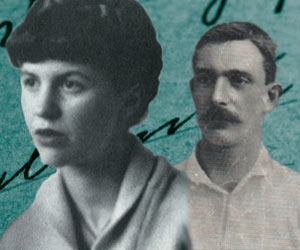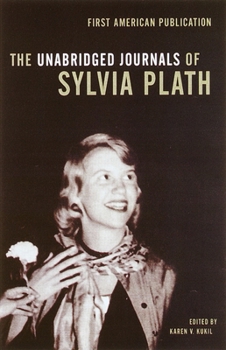The Unabridged Journals of Sylvia Plath
Select Format
Select Condition 
Book Overview
The complete, uncensored journals of Sylvia Plath--essential reading for anyone who has been moved and fascinated by the poet's life and work. A genuine literary event.... Plath's journals contain marvels of discovery. --The New York Times Book Review
Sylvia Plath's journals were originally published in 1982 in a heavily abridged version authorized by Plath's husband, Ted Hughes. This new edition is an exact and...
Format:Paperback
Language:English
ISBN:0385720254
ISBN13:9780385720250
Release Date:October 2000
Publisher:Vintage
Length:768 Pages
Weight:1.61 lbs.
Dimensions:1.9" x 5.1" x 7.9"
Customer Reviews
6 ratings
Published by Kevin , 8 years ago
I've been reading through this book for the past couple of weeks, just popping in and reading bits and pieces periodically. This journal gives great insight on Plath's life and what she faced daily.
An idiosyncratic pure beat and melodic force
Published by Thriftbooks.com User , 18 years ago
Whether you read The Journals of Sylvia Plath as a writer's notebook, as scenes from a marriage, as social history, or as daily bulletins from one of the most star-crossed love stories of all time, the journal's words help to keep alive the writer who has been called "the literary girl's Elvis" while also bringing us news of how she thought, how she taught, what she read, how she wrote, along with the most primal news of her legendary marriage, a marriage that so often seemed golden, closer than close, but whose ardent claustrophobia was more precious to Sylvia than it was to Ted, and whose tragic aftermath also turned out to be notorious, horrible, with Assia Wevill (the woman Hughes left Plath for) killing herself in a copycat suicide, and also killing their little daughter, and with even Hughes's final wife (the non-writer and therefore the one who was supposed to be stable) threatening to kill herself when she discovered, not long before Ted's death, that he not only had a mistress, he had also over the years been the lover of a fair (no, make that unfair) number of others. Plath also had to suffer the pain of seeing less gifted writers beat her out for literary prizes: "All I need now is to hear that GS (George Starbuck) or MK (Maxine Kumin) has won the Yale and get a rejection of my children's book..." And what reader (writer or not) will not empathize with "Must not be accusing, although I feel like it..." As it turned out, George Starbuck did win the Yale and, reading this, I found myself wanting to say to Plath, "Listen, Sylvia, when we here in the twenty-first century hear the word `Starbuck,' we think of coffee, we don't ever think of George," and then not long after thinking this I discovered her similar wish to offer writerly comfort to Henry James ("I long to make known to him his posthumous reputation"). And how can you not to love a writer who, in notes to herself about a story she wants to write (in this case about George Starbuck and his mistress, the poet Anne Sexton) begins her notes this way: "The story about George, Anne and the children. An insufferable woman (myself of course) gets involved..." The Journals also bring to vivid life many of the great (and also some of the less great) poets of the twentieth century: W. H. Auden ("his coarse, tweedy brown jacket and burlap-textured voice"); Ralph Rogers, with "his slick, nervous smile, his jittery huckster hand jiggling money in his pants pocket"; Adrienne Rich ("round and stumpy, all vibrant short hair" under a tulip-red umbrella). As for the poems Hughes wrote to Plath in Birthday Letters, although they often seem clumsily self-justifying and garishly homespun, they do also contain moments that feel incredibly emotional, hacked out of real feeling. Plath's poems, on the other hand, are of a more stunning order, even the notoriously grandstanding poems like "Daddy," but this is even more true of the absolutely incandescent and astounding poems--"Sheep in Fog," "Letter
A BEST FRIEND FOR YOUR BOOKSHELF
Published by Thriftbooks.com User , 22 years ago
The good thing about journals is that after you've read them you can dip in again at any page and get caught up in that day's events, action, dilemmas, reflections; once you become more familiar with the contents you can return to favourite passages for pleasure. It's almost like having a best friend on your bookshelf. The biggest barrier for anyone contemplating writing down their innermost thoughts is crossing that line of inhibition and saying what your really feel about the most intimate of things, without censoring yourself (with the fear of friends or family possibly reading your journal) or for feeling stupid or embarrassed about opening up on the page and seeing your thoughts in print.Not many people could write a diary account of their life as honestly as Sylvia Plath. It amazes me how disciplined - and with so much devotion - she was able to 'jot down' day after day the beautifully written, perfect prose in her journals; and from such an early age as well, eighteen (she actually started keeping journals in childhood but this edition covers only her adult life). In her own unmistakable voice we see 'Sivvy' (as she liked to call herself) as the young, naive teenager on the threshold of life, dreaming of the romantic love affairs she longs for; the excited college student working on a New York magazine, an experience she later used for her only novel The Bell Jar; trips to Paris and her honeymoon in Spain; married life with Ted Hughes, the mother of his two children; and all the time living in the shadow of the black depression that would descend on her without any warning.With Sylvia Plath's tragic suicide you can't help but think: what a waste of life, what a wasted talent. Perhaps it was because she knew her own psyche best - she was constantly trying to figure out her feelings on the pages of her journal - that she was in such a hurry to get everything down before the inevitable happened. Maybe she just burned herself out too soon. The final flurry of stunningly original poems that would later become the posthumous collection Ariel are testament to the short life she was able to pack into the pages of her hefty Journals.The only thing that spoils this otherwise marvellous new edition of the Journals is editor Karen V. Kukil's decision to list the notes of identification of people and places at the back of the book instead of footnotes on the bottom of the pages; it's irritating and bothersome to have to continually flick back and forth and use two different bookmarks to keep your place.Two other books can be read in conjunction with the Journals, and I highly recommend them both. Sylvia Plath's Letters Home - written mainly to her mother Aurelia Plath, who edited this volume of correspondence and also provides biographical content about her daughter's life in a lengthy introduction and accompanying side-notes to letters when needed for clarification. Birthday Letters is a beautiful collection of poems by Ted Hughes, written as letters
Great book!
Published by Thriftbooks.com User , 24 years ago
It's about time that we got the nearly full story of what she really thought and felt. Although we will probably never see those missing journals which were written months prior to her death, still what remains is riveting. As for the person who mentioned how disturbing her entries are and how she comes across as a 'monster,' well, apparently some people have no appreciation for a) how complicated artistic people are; and b) how we ALL have these thoughts from time to time, whether we are artistic or not. We just don't take the time to write them down in journals for pedantic 'chicken soup' types to thoughtlessly analyze after we're dead.I do however, agree with the intelligent comment about the Euripedean relationship with that mother. Good use of Greek mythology. I think it was Camille Paglia who pegged the real source of Plath's anger when she described the redoubtable Aurelia Plath as someone who could castrate you from fifty paces. Hilarious and true. Poor Sylvia. I would be [angry] too with a mother like that.Thank you for these wonderful glimpses into the human condition. If Plath's a monster, then we all are.
At last, the full deal
Published by Thriftbooks.com User , 24 years ago
When Plath's journals were first released fifteen years ago in highly abridged form (thanks to the cuttings of her husband, Ted Hughes), the ellisions seemed as tantalizing as what remained. It has long been recognized that Plath was one of the most articulate minds of her generation, and her life story (in particular, her first breakdown in college, and then her courtship and later break-up with Hughes) has been the source of fascination among scholars and the general public for decades. Hughes's death made possible the restoration of many of the lost passages concerning him--and Plath's other portraits of friends and her mother--for the first time. Clearly she emerges as a ruthless observer of the human condition, and a fantastic wordsmith: her description of something as mundane and disgusting as picking her nose becomes something of a revelation through her linguistic gifts. She also emerges as something of a monster: although it does much to excuse her spiteful caricatures of her acquaintances--and her almost Euripidean fury towards her poor mother--by remembering that the journals served as cathartic self-therapy, still the venom within them remains deeply disturbing. The greatest handicap of this edition is its strange chronological sequencing: Kukil often positions appendices in very odd places, disrupting the narrative of the artist's life.
A comprehensive and moving document
Published by Thriftbooks.com User , 24 years ago
This long awaited document can be considered a text book for all who are interested in the life, work, and process of the writer Sylvia Plath. Karen Kukil's efforts to include every last detail of Plath's journals, including drawings and poem fragments, are incredibly well executed. The end result is a moving and informative book.
The Unabridged Journals of Sylvia Plath Mentions in Our Blog

Sylvia and Ted: Their Troubled Romance
Published by Ashly Moore Sheldon • February 26, 2021
Sixty-five years ago today, Sylvia Plath and Ted Hughes met at a party in Cambridge. Their connection was immediate, powerful, and violent—a portent of their future together. Almost exactly seven years later Plath would die by suicide.






